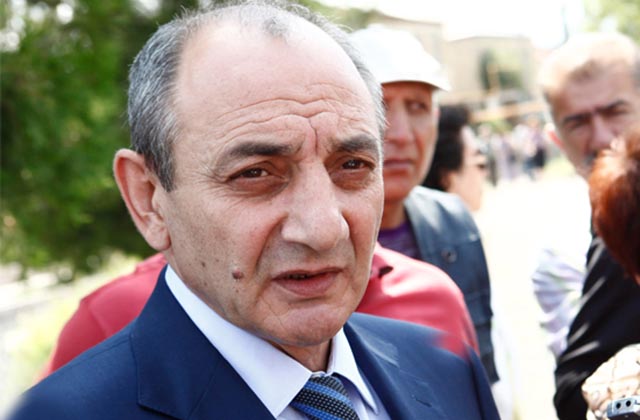Mutual Concessions are Necessary: Bako Sahakyan

Bako Sahakyan, President of the Nagorno Karabakh Republic, gave an interview to Journal du Parlement newspaper. Full interview has been provided by the Presidential Administration of NKR.
Mr. President, Nagorno Karabakh isn’t recognized by the international community as a state. The conflict seems to get increasingly waterlogged. What needs to be done for restart dialogue and have advancement in the conflict settlement issue?
Several political, legal and psychological steps are necessary for restarting dialogue. In the political arena, the provisions of the 1994-1995 ceasefire regime agreements should firstly be strictly followed, as well as the calls of international community and mediator countries for settling the conflict exclusively by peaceful means. In the legal arena the complete format of negotiations process should be restored, where the Nagorno Karabakh Republic is a full side of the conflict, which was confirmed in the 1994 OSCE Budapest summit. It is impossible to settle the Azerbaijani-Karabakhi conflict in the absence of Nagorno Karabakh – one of the direct sides. Regarding the psychological part, here the main obstruction is Azerbaijan’s revanchist policy. Azerbaijan must find the strength in itself to refuse the stereotypes towards Nagorno Karabakh and Armenian people and respect fundamental rights and freedom of other peoples, as well as refuse unpromising and adventurist policy.
Otherwise, in terms of diplomacy, what are the concessions, which you will be ready to make in order to ease the tension?
Any conflict, especially the Azerbaijani-Karabakhi conflict, cannot have a comprehensive solution through concessions. Mutual concessions are necessary. Moreover, these mutual concessions should be reasonable and equivalent. Regarding the limit of mutual concessions, in no way should they weaken the security system and act as a tempting circumstance for aggression for the other side.
In your opinion, has there been progress in the international political recognition of Nagorno Karabakh? And what consequences can it have on the stability of South Caucasus?
The international recognition process of Nagorno Karabakh is proceeding quite actively, and we have already achieved several results in this direction. As of today, administrative entities of USA’s Massachusetts, Rhode Island, Maine, Louisiana, California, Georgia, Hawaii and Australia’s New Wales’s states, Basque Country, Fresno, Los Angeles and several others have expressed in favor of recognizing the independence of Nagorno Karabakh. We will have new successes in the future also. I am sure that the international recognition of our country will have positive impact on stability in South Caucasus, integrating it even more in the international community.
The ceasefire regime is in force since May 12, 1994. Why was it violated in the beginning of April?
The ceasefire regime was violated as result of the large-scale four day war waged by Azerbaijan. And the main reason for this kind of aggression is the state propaganda of Azerbaijan, which is based on Armenophobic policy and the system of government, which can be labeled as totalitarian and dictatorship. And these kind of states, as global history has showed numerous times, always conduct aggressive policy.
What is the situation of refugees today?
As result of Azerbaijani aggression several settlements of Nagorno Karbakh suffered, hundreds have lost their homes and were temporarily transported to nearby settlements, capital Stepanakert and several cities in Armenia. The state is working on various programs to improve their social conditions and restore the homes.
Which are the resources available to Nagorno Karabakh? How is the financial situation developing in the region? Do French or European companies operate here?
Main sources of economic development of Nagorno Karabakh are its own resources, the assistance of Armenia and Diaspora. Prior to the April war the average annual growth of our economy comprised 9%. Of course, the war had negative impact on economic development, but we will do everything possible to ensure the country’s progress in the future. The banking sector is the most dynamic developing sector in Nagorno Karabakh. Branches of various leading banks are represented in our country, and we hope the number will grow. Regarding the involvement of French or European companies, such cooperation is present, however it is proceeding mainly through representatives of the Armenian Diaspora.
You demand self-determination of population for your independence. Does this imply that in your opinion, any minority in any geographical circle is authorized to demand self-determination?
All peoples have the right of self determination, which is one of the fundamental principles of international right. For 67 years the people of Nagorno Karabakh have struggled to throw off the Soviet Azerbaijani’ colonial yoke which was artificially and strangely created for us. By the way, this decision was adopted and realized against the will of our people by the Caucasus branch of the Bolshevik party. In 1988 we realized our right to self determination. In 1991 we created an independent Republic. We were forced to defend it from Azerbaijani aggression. And for already a quarter century we are building an independent, sovereign, democratic and social state. By the way, in terms of shaping a democratic and civil society our country is incomparably ahead of Azerbaijan and many other recognized states. It is obvious, that under all this, Nagorno Karabakh has earned the right to be recognized by the international community and the civilized world.
Finally, what message would you like to address to the French and European political class through the Journal du Parlement and Comité de l’Europe newspapers?
We are frequently asked this kind of question, which, essentially, reflects the vision of Nagorno Karabakh-Europe relations. The fact that we belong to a common civilization, I think is undisputed. Some even announce that Europe ends in Nagorno Karabakh. We think, Europe starts in Nagorno Karabakh.

























